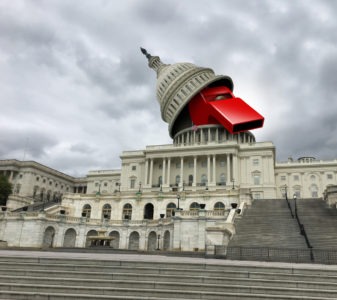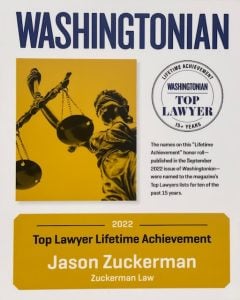False Claims Act Whistleblower Protection

As Congress recognized when it strengthened the qui tam provisions of the False Claims Act, “few individuals will expose fraud if they fear their disclosures will lead to harassment, demotion, loss of employment, or any other form of retaliation” and therefore the FCA “seeks to halt companies and individuals from using the threat of economic retaliation to silence whistleblowers, as well as assure those who may be considering exposing fraud that they are legally protected from retaliatory acts.” S. Rep. No. 99-345, at 34 (1986).
That is why the FCA provides a wide range of damages, including uncapped compensatory damages and double back pay (double lost wages). Courts can also award prevailing FCA whistleblowers front pay for lost future income. And other federal and state whistleblower protection laws may provide additional remedies, including punitive damages.
If you are seeking legal representation in a False Claims Act whistleblower retaliation case, call our False Claims Act whistleblower retaliation lawyers today for a free consultation at (202) 262-8959.






How the False Claims Act Protects Whistleblowers
To learn more about the False Claims Act whistleblower protection law, see our FCA whistleblower retaliation FAQ, which answers these questions:
- Who is protected under the False Claims Act whistleblower protection law?
- What remedies or damages can a whistleblower recover under the whistleblower protection provision of the False Claims Act?
- What is protected whistleblowing or protected conduct under the False Claims Act Anti-Retaliation Provision?
- Does the False Claims Act anti-retaliation law protect efforts to stop a government contractor from defrauding the government?
- Is False Claims Act Whistleblower Protection Limited to Disclosures About the Whistleblower’s Employer?
- Does the False Claims Act retaliation law protect internal reporting to a government contractor or grantee?
- Does the False Claims Act prohibit retaliation against an employee for the employee’s refusal to participate in a fraudulent scheme?
- What types of disclosures or whistleblowing are protected under the False Claims Act whistleblower protection law?
- What acts of retaliation are prohibited by the False Claims Act anti-retaliation provision?
- Is constructive discharge prohibited by the False Claims Act anti-retaliation law?
- What must a whistleblower prove to prevail in a False Claims Act whistleblower retaliation case?
- How can an FCA retaliation plaintiff prove notice of protected conduct?
- Is there a heightened notice requirement for the whistleblower to prove that she went beyond her job duties when she blew the whistle?
- What is the statute of limitations for a False Claims Act Whistleblower Retaliation Case?
- Does the False Claims Act whistleblower retaliation law authorize individual liability?
- Is a disclosure about fraudulent inducement of a contract protected under the FCA retaliation law?
- Does the False Claims Act Prohibit the Waiver or Release of False Claims Act Retaliation Claims?
- Does the NDAA Whistleblower Protection Law Provide Additional Protection for Whistleblowers at Government Contractors and Grantees?
- Can a Government Contractor Bring a False Claims Act Whistleblower Retaliation Claim?
- Can a Government Contractor Obtain Dismissal of a False Claims Act Claim to Maintain the Confidential Nature of Classified Information?
- Does the Layoff of a Whistleblower Immunize a Company from Liability Under the False Claims Act Retaliation Law?
- Does the False Claims Act Whistleblower Protection Law Preempt Common Law Wrongful Discharge Claims?
False Claims Act Whistleblower Retaliation
False Claims Act Whistleblower Retaliation Remedies and Damages
False Claims Act Qui Tam Whistleblower Protection Law
A qui tam whistleblower can be eligible for a large recovery for reporting fraud on the government. But there are obstacles to proving FCA liability and recovering a qui tam award or relator share, and there are unique rules and procedures that govern qui tam whistleblower cases. Therefore, it is critical to retain an experienced False Claims Act whistleblower lawyer to maximize your recovery. This FAQ provides an overview of some of the key aspects of False Claims Act claims.
- What is a qui tam whistleblower lawsuit?
- What types of false claims are prohibited by the False Claims Act?
- What is the first-to-file bar in False Claims Act qui tam cases?
- What is the requirement to file a False Claims Act qui tam action under seal?
- Are False Claims Act whistleblowers protected against retaliation?
- What is a reverse false claim?
- What is the statute of limitations for a False Claims Act qui tam action?
- What is the public disclosure bar in the False Claims Act?
- What is the original source exception to the public disclosure bar?
- What is materiality under the False Claims Act?
- What is “Scienter” Under the False Claims Act?
- Is a Violation of the Anti-Kickback Law Also a Violation of the False Claims Act?
- Does the False Claims Act Prohibit Bid-Rigging?
- Does the False Claims Act Prohibit Fraudulent Inducement of a Contract?
- Can a violation of Good Manufacturing Practices give rise to False Claims Act Liability?
- Is there a heightened pleading requirement for False Claims Act qui tam cases?
- Does the False Claims Act authorize treble damages?
- Must a False Claims Act qui tam relator have firsthand knowledge of all aspects of the fraud?
FAQs About False Claims Act Whistleblower Protection Law
False Claims Act Whistleblower Protection LawLegislative History of 1986 False Claims Act Whistleblower Protection Provision
Senate Judiciary Committee Report 110-507 accompanying S. 2041 states:
The 1986 Amendments included Section 3730(h) which provides
a cause of action for individuals who faced retaliation in
response to bringing forth FCA claims of fraud against the
Government.\91\ Congress included this provision in the 1986
Amendments because, as the Committee noted, it recognized
``that few individuals will expose fraud if they fear their
disclosures will lead to harassment, demotion, loss of
employment, or any other form of retaliation.'' \92\ While this
provision was designed to protect employees from employer
retaliation, over the past 20 years courts have limited this
protection through various decisions narrowly interpreting the
definition of ``employee'' and thus leaving contractors and
subcontractors open to retaliation.
---------------------------------------------------------------------------
\91\ S. Rep. No. 99-345 supra note 1, at 5299.
\92\ Id.
---------------------------------------------------------------------------
For example, the Third and Fourth Circuits have held that
an independent contractor is not protected under section
3730(h).\93\ To correct this loophole, section 5 clarifies
section 3730(h) by simply including the terms ``government
contractor, or agent'' in addition to the term ``employee.''
The Committee believes that it is necessary to include these
additional terms to assist individuals who are not technically
employees within the typical employer-employee relationship,
but nonetheless have a contractual or agent relationship with
an employer. The Committee believes this is a vitally important
clarification that respects the spirit and intent of the 1986
Amendments while offering whistleblower protections to
contractors and agents who may come across fraud against the
Government and report it under the FCA.
---------------------------------------------------------------------------
\93\ See United States ex rel. Watson v. Connecticut Gen. Life
Ins., 2004 U.S. App. LEXIS 1736 (3d Cir. 2004); Vessell v. DPS Assocs.
of Charleston, Inc., 148 F.3d 407 (4th Cir. 1998).
---------------------------------------------------------------------------
False Claims Act Whistleblower Protection Attorneys
The experienced False Claims Act whistleblower protection attorneys at leading whistleblower law firm Zuckerman Law have substantial experience representing whistleblowers disclosing fraud and other wrongdoing at government contractors and grantees. To schedule a free preliminary consultation with our False Claims Act whistleblower lawyers, click here or call us at 202-262-8959.






Our experience includes:
- Representing qui tam relators in False Claims Act actions concerning off-label marketing, false billing, and education loan fraud (inflating entitlement to interest rate subsidies).
- Representing whistleblowers in NDAA retaliation claims before the Department of Defense, and Department of Homeland Security, Department of Justice Offices of Inspectors General.
- Litigating False Claims Act retaliation cases.
- Representing whistleblowers disclosing fraud on the government in Congressional investigations.
- Training judges, senior Office of Inspector General officials, and federal law enforcement about whistleblower protections.
In addition, we have substantial experience representing whistleblowers under the Whistleblower Protection Act (WPA) and enforcing the WPA, the law that the NDAA whistleblower provisions are based upon.
Before hiring a lawyer for a high-stakes whistleblower case, assess the lawyer’s reputation, prior experience representing whistleblowers, knowledge of whistleblower laws and prior results. And consider the experience of other whistleblowers working with that attorney. See our client testimonials by clicking here.
- U.S. News and Best Lawyers® have named Zuckerman Law a Tier 1 firm in Litigation – Labor and Employment in the Washington DC metropolitan area.
- Dallas Hammer has extensive experience representing whistleblowers at government contractors in retaliation and rewards claims and has written extensively about cybersecurity whistleblowing. He was selected by his peers to be included in The Best Lawyers in America® in the category of employment law in 2021 and 2022.
Described by the National Law Journal as a “leading whistleblower attorney,” founding Principal Jason Zuckerman has established precedent under a wide range of whistleblower protection laws and obtained substantial compensation for his clients and recoveries for the government in whistleblower rewards and whistleblower retaliation cases. He served on the Department of Labor’s Whistleblower Protection Advisory Committee, which makes recommendations to the Secretary of Labor to improve OSHA’s administration of federal whistleblower protection laws. Zuckerman also served as Senior Legal Advisor to the Special Counsel at the U.S. Office of Special Counsel, the federal agency charged with protecting whistleblowers in the federal government. At OSC, he oversaw investigations of whistleblower claims and obtained corrective action or relief for whistleblowers.
- Matt Stock is a Certified Public Accountant, Certified Fraud Examiner and former KPMG external auditor. As an auditor, Stock developed expertise in financial statement analysis and internal controls testing and fraud recognition. He uses his auditing experience to help whistleblowers investigate and disclose complex financial frauds to the government.
- Zuckerman was recognized by Washingtonian magazine as a “Top Whistleblower Lawyer” (2020, 2018, 2017, 2015, 2009, and 2007), selected by his peers to be included in The Best Lawyers in America® in the category of employment law (2011-2021) and in SuperLawyers in the category of labor and employment law (2012 and 2015-2021), is rated 10 out of 10 by Avvo, based largely on client reviews, and is rated AV Preeminent® by Martindale-Hubbell based on peer reviews
- We have published extensively on whistleblower rights and protections, and speak nationwide at seminars and continuing legal education conferences. We blog about new developments under whistleblower retaliation and rewards laws at the Whistleblower Protection Law and SEC Awards Blog, and in 2019, the National Law Review awarded Zuckerman its “Go-To Thought Leadership Award” for his analysis of developments in whistleblower law.
- Our attorneys have been quoted by and published articles in leading business, accounting, and legal periodicals, including The Wall Street Journal, Forbes, CNBC, MarketWatch, Vox, Accounting Today, Going Concern, Law360 – Expert Analysis, Investopedia, The National Law Review, inSecurities, Government Accountability Project, S&P Global Market Intelligence, Risk & Compliance Magazine, The D&O Diary, The Compliance and Ethics Blog, Compliance Week and other printed and electronic media.
Zuckerman Law has written extensively about whistleblower protections for employees of government contractors and grantees, including the following articles and blog posts:
- Boosting Contractor Employee Whistleblower Protections, Law 360 (December 2016)
- Ninth Circuit Rejects “Honest Belief” Defense in Whistleblower Retaliation Case
- Can a Government Contractor Bring a False Claims Act Whistleblower Retaliation Claim?
- False Claims Act Whistleblower Prevails in First Circuit Appeal
- Is Whistleblowing About Upcoding Protected Under the False Claims Act’s Anti-Retaliation Provision
- Boosting Contractor Employee Whistleblower Protections, Law 360 (December 2016)
- Fourth Circuit Clarifies Broad Scope of False Claims Act Protected Whistleblowing
- New Tools to Combat Whistleblower Retaliation, Taxpayers Against Fraud Education Fund Quarterly Review, Vol. 57 (October 2010)
- GAO Report Calls for Improvements in Government Contractor Whistleblower Protections
- False Claims Act Retaliation Decision Underscores Broad Scope of FCA Whistleblower Protection
- NDAA Provides Robust Whistleblower Protection
- FAR Amendment Bars Agencies from Subsidizing Whistleblower Retaliation
- NDAA Contractor Whistleblower Protection Law Highly Effective in Rooting Out Fraud
- Congress Enacts Anti-Gag Provision in Cromnibus Spending Bill
- Whistleblower Lawyer Jason Zuckerman Will Speak About False Claims Act Litigation at Taxpayers Against Fraud Conference
- Whistleblower Protections Under the Whistleblower Protection Act, Practical Law (October 2016)
- Whistleblower Lawyer Jason Zuckerman Quoted in National Law Journal
- Whistleblower Lawyer Jason Zuckerman Quoted About Federal Employee Whistleblower Rights
- Washington Post Quotes Whistleblower Attorney Jason Zuckerman About Chilling Effect of Insider Threat Program
- How to foster a more ethical culture
- Whistleblower Lawyer Jason Zuckerman Quoted About MacLean Whistleblower Protection Act Case
- Trump Questionnaire Raises Concerns About Retaliation Against Energy Department Staff
- CFPB official wants to silence a whistleblower before he can talk to Congress
whistleblower_lawyers_012017_infographic


 Described by the National Law Journal as a “
Described by the National Law Journal as a “